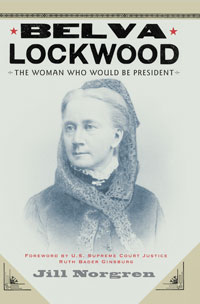Belva Lockwood: The Woman Who Would Be President

Foreword by U.S. Supreme Court Justice Ruth Bader Ginsburg
In Belva Lockwood: The Woman Who Would Be President (New York University Press), I recount, for the first time, the life story of one of the nineteenth century’s most surprising and accomplished advocates for women’s rights. I show how Lockwood was fearless in confronting the male establishment, commanding the attention of presidents, members of Congress, influential writers, and everyday Americans. Obscured for too long in the historical shadow of her longtime colleague, Susan B. Anthony, Lockwood steps into the limelight at last in this biography.
Born on a farm in upstate New York in 1830, Lockwood married young and reluctantly became a farmer’s wife. After her husband's premature death, however, she earned a college degree, became a teacher, and moved to Washington, DC with plans to become an attorney-an occupation all but closed to women. Not only did she become one of the first female attorneys in the U.S., but in 1879 became the first woman ever allowed to practice at the bar of the Supreme Court.
In 1884 Lockwood continued her trailblazing ways as the first woman to run a full campaign for the U.S. Presidency. She ran for President again in 1888. Although her candidacies were unsuccessful (as she knew they would be), Lockwood demonstrated that women could compete with men in the political arena. After these campaigns she worked tirelessly on behalf of the Universal Peace Union, hoping, until her death in 1917, that she, or the organization, would win the Nobel Peace Prize.
Belva Lockwood deserves to be far better known. It is likely that Lockwood would be widely recognized today as a feminist pioneer if most of her personal papers had not been destroyed after her death. In this biography I hope to ensure Lockwood’s rightful place in history in a book others have cited for being meticulously researched and beautifully written.
In 2008 the American Library Association named Belva Lockwood to its 2007 "Best of the Best" university press books. It has been widely praised in reviews. Choice called it "highly recommended." Law and History Review cited the biography as a "must" for all those interested in U.S. women's history or the nineteenth-century practice of law." Ms. Magazine pointed to its presentation of a "fearless advocate for women's rights." In the New Republic Christine Stansell wrote "Norgren has the great discernment to see Lockwood's life as large and anticipatory rather than eccentric and half-realized....[Norgren is] a legal historian of considerable skill." The New York Sun observed that "Norgren...shows how Lockwood loved the law...in eloquent detail." Journalist/biographer Joan Biskupic describes the book as beautifully weaving the personal and political ordeals of Belva Lockwood's life, while biographer and historian Blanche Wiesen Cook says simply, "a splendid biography."
In Belva Lockwood: The Woman Who Would Be President (New York University Press), I recount, for the first time, the life story of one of the nineteenth century’s most surprising and accomplished advocates for women’s rights. I show how Lockwood was fearless in confronting the male establishment, commanding the attention of presidents, members of Congress, influential writers, and everyday Americans. Obscured for too long in the historical shadow of her longtime colleague, Susan B. Anthony, Lockwood steps into the limelight at last in this biography.
Born on a farm in upstate New York in 1830, Lockwood married young and reluctantly became a farmer’s wife. After her husband's premature death, however, she earned a college degree, became a teacher, and moved to Washington, DC with plans to become an attorney-an occupation all but closed to women. Not only did she become one of the first female attorneys in the U.S., but in 1879 became the first woman ever allowed to practice at the bar of the Supreme Court.
In 1884 Lockwood continued her trailblazing ways as the first woman to run a full campaign for the U.S. Presidency. She ran for President again in 1888. Although her candidacies were unsuccessful (as she knew they would be), Lockwood demonstrated that women could compete with men in the political arena. After these campaigns she worked tirelessly on behalf of the Universal Peace Union, hoping, until her death in 1917, that she, or the organization, would win the Nobel Peace Prize.
Belva Lockwood deserves to be far better known. It is likely that Lockwood would be widely recognized today as a feminist pioneer if most of her personal papers had not been destroyed after her death. In this biography I hope to ensure Lockwood’s rightful place in history in a book others have cited for being meticulously researched and beautifully written.
In 2008 the American Library Association named Belva Lockwood to its 2007 "Best of the Best" university press books. It has been widely praised in reviews. Choice called it "highly recommended." Law and History Review cited the biography as a "must" for all those interested in U.S. women's history or the nineteenth-century practice of law." Ms. Magazine pointed to its presentation of a "fearless advocate for women's rights." In the New Republic Christine Stansell wrote "Norgren has the great discernment to see Lockwood's life as large and anticipatory rather than eccentric and half-realized....[Norgren is] a legal historian of considerable skill." The New York Sun observed that "Norgren...shows how Lockwood loved the law...in eloquent detail." Journalist/biographer Joan Biskupic describes the book as beautifully weaving the personal and political ordeals of Belva Lockwood's life, while biographer and historian Blanche Wiesen Cook says simply, "a splendid biography."